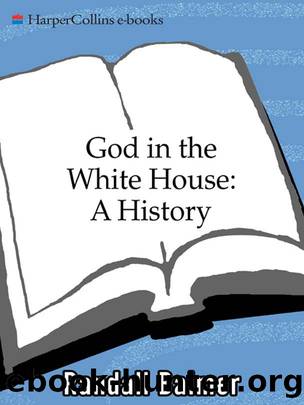God in the White House: A History by Randall Balmer

Author:Randall Balmer [Balmer, Randall]
Language: eng
Format: epub
Published: 0101-01-01T00:00:00+00:00
Judging by the immediate results of the Iowa precinct caucuses, where Bush finished ahead of the rest of the field, and by his winning the Republican nomination and his victory (albeit contested) in November 2000, many Americans approved of Bushâs faith statementsâor at least they didnât find them objectionable. Voters warmed to Bushâs evangelical narrative of personal dissolution and dramatic redemption. And it is at least possible that theyâcertainly the partisan conservativesâprojected that scenario onto the nation: If Bush could, with Jesusâs help, effect his own reclamation from alcohol, perhaps he could rescue the nation from the tawdriness of the Clinton years. Salvation by proxy.
That is a highly partisan reading, of course, and it fails to account for a multitude of other factors: Goreâs stiff campaign style, for example; the cyclical demand for change; and what at least one pundit called âClinton fatigue.â The larger point is that, by 2000, the contours of an individual candidateâs faith and system of belief had become firmly ensconced in the arena of public discourse.
The 2000 presidential campaign also suggests that the particularities of a candidateâs faith or religion matter little, so long as the fidelity appears to be sincere. Goreâs running mate, Joseph Lieberman, an observant Jew, was the first Jew in American history to run for national office on a major-party ticket. Because Jews comprise less than 2 percent of the American population in an overwhelmingly Christian nation, some Democrats worried that Liebermanâs faith might be a political liability. Not so. Lieberman answered some queries about his policy of refusing to campaign on the Sabbath, and the issue quickly died.
Americans, apparently, if the Lieberman case provides any indication, want their candidates to profess some kind of faithâand they seem not terribly concerned about the particularities of that faith. âOur form of government makes no sense unless it is founded in a deeply felt religious faith,â Dwight Eisenhower reputedly declared in 1952, âand I donât care what it is.â Some variation of that sentiment applies to presidential politics at the turn of the twenty-first century as well.22
Download
This site does not store any files on its server. We only index and link to content provided by other sites. Please contact the content providers to delete copyright contents if any and email us, we'll remove relevant links or contents immediately.
| Buddhism | Christianity |
| Ethnic & Tribal | General |
| Hinduism | Islam |
| Judaism | New Age, Mythology & Occult |
| Religion, Politics & State |
Cecilia; Or, Memoirs of an Heiress — Volume 1 by Fanny Burney(32546)
Cecilia; Or, Memoirs of an Heiress — Volume 2 by Fanny Burney(31944)
Cecilia; Or, Memoirs of an Heiress — Volume 3 by Fanny Burney(31929)
The Secret History by Donna Tartt(19052)
Sapiens: A Brief History of Humankind by Yuval Noah Harari(14368)
Leonardo da Vinci by Walter Isaacson(13316)
The Radium Girls by Kate Moore(12018)
Sapiens by Yuval Noah Harari(5366)
How Democracies Die by Steven Levitsky & Daniel Ziblatt(5215)
The Wind in My Hair by Masih Alinejad(5092)
Homo Deus: A Brief History of Tomorrow by Yuval Noah Harari(4908)
Endurance: Shackleton's Incredible Voyage by Alfred Lansing(4769)
Man's Search for Meaning by Viktor Frankl(4582)
The Silk Roads by Peter Frankopan(4526)
Millionaire: The Philanderer, Gambler, and Duelist Who Invented Modern Finance by Janet Gleeson(4465)
The Rape of Nanking by Iris Chang(4203)
Joan of Arc by Mary Gordon(4101)
The Motorcycle Diaries by Ernesto Che Guevara(4089)
Stalin by Stephen Kotkin(3957)
